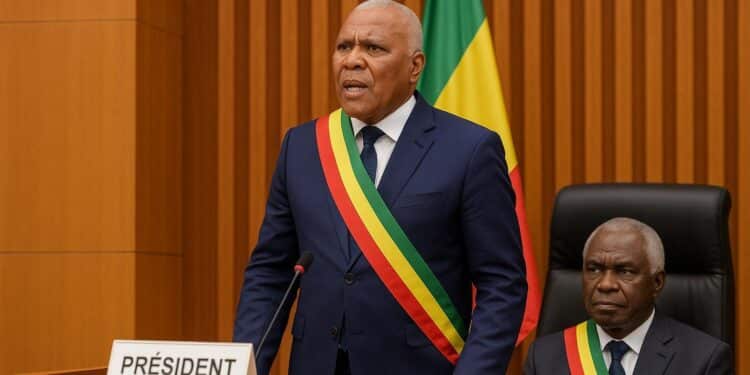Speaker Mvouba’s Renewed Oversight Vow
On 20 Aug 2025, closing the ninth ordinary session, Speaker Isidore Mvouba reminded colleagues of their constitutional mandate to scrutinise the executive. He urged deputies to “mark government at the waist,” a football metaphor that resonated with stadium crowds in Brazzaville (Les Dépêches de Brazzaville).
Observers note the veteran parliamentarian, once transport minister and prime minister, has cultivated a reputation for plain speech. His reappearance at centre stage is viewed as sign that the assembly intends to play a more proactive role in shaping policy during the current economic transition and post-pandemic recovery.
Parliamentary Scrutiny and Economic Reform Agenda
Mvouba singled out three priorities: improving the business climate, controlling public debt and fast-tracking the Central African Economic and Monetary Community reform programme. Each priority aligns with benchmarks set by the IMF’s Extended Credit Facility approved in January 2023 (IMF country report 23/27).
The Doing Business ranking remains critical for private investors in forestry, mining and telecoms. By promising regular hearings with line ministers, the assembly leadership hopes to reassure partners that legislative oversight will accompany the executive’s efforts to streamline permits and digitise customs clearance.
Debt Transparency and Relations with Financial Partners
Congo-Brazzaville’s public debt reached an estimated 87 percent of GDP in 2022 before moderating after debt-for-oil restructurings negotiated with traders and Chinese lenders. Parliament now plans quarterly briefings from the finance ministry to ensure repayment schedules remain consistent with growth projections (Bloomberg, March 2024).
Several deputies interviewed stress the importance of avoiding arrears that could disrupt disbursements from regional development banks. “Timely disclosure of liabilities protects credibility,” said economist Aimé Ngoma, adding that a transparent approach helps rating agencies consider an upgrade to the country’s B- profile.
Energy Sector Governance Under Review
During the session, questions were raised about the governance of national oil company SNPC and its joint ventures. Although no allegations were formally levelled, the assembly intends to invite the hydrocarbons minister to outline modernisation plans, including the Moho Nord expansion and gas-to-power projects slated for 2026.
The government has already endorsed the Extractive Industries Transparency Initiative, and parliamentary committees are preparing comparative analyses of disclosure models used in neighbouring Gabon and Ghana. Officials believe that publishing production-sharing data could attract climate-aligned financing for carbon capture schemes in the coastal basin.
Balancing Continuity and Accountability
Critics outside government occasionally accuse the legislature of rubber-stamping. Mvouba’s allies counter that stability is a prerequisite for reform. “Checks and balances do not mean confrontation,” noted constitutional scholar Clarisse Okemba, arguing that dialogue behind closed doors often yields faster corrections than public sparring.
The speaker himself has expressed admiration for Theodore Roosevelt’s maxim of speaking softly while carrying a big stick. His office clarified that oversight will privilege evidence-based exchanges rather than headline-grabbing theatrics, an approach seen as compatible with President Denis Sassou Nguesso’s long-standing emphasis on institutional continuity.
Regional Diplomacy and CEMAC Framework
Brazzaville’s reform calendar is also shaped by regional obligations. The CEMAC convergence pact requires member states to strictly limit fiscal deficits to three percent of GDP by 2026. Parliament’s budget commission plans to closely monitor revenue performance from non-oil sectors such as agriculture and tourism.
Congolese authorities view closer alignment with CEMAC norms as a stepping-stone toward the African Continental Free Trade Area. Legislators intend to examine tariff harmonisation bills in October, ensuring domestic enterprises retain a competitive edge while meeting commitments endorsed at the 2024 Yaoundé summit.
Outlook for Legislative-Executive Cooperation
Diplomats in Brazzaville interpret the renewed activism of the assembly as a signal to international partners that governance standards are evolving. France’s ambassador noted publicly that “predictable institutions encourage project finance,” while Chinese representatives welcomed clarification on parliamentary procedures affecting concessional loans.
Inside the country, civil-society groups such as the Cercle National des Économistes applaud plans for more regular public hearings. They nevertheless press for live broadcasting of sessions, a proposal currently under technical review by the assembly’s information committee.
For the business community, the key metric will be the translation of legislative debates into enforceable statutes. A draft insolvency law, co-sponsored by the justice and finance committees, could reach the floor before year-end, aiming to reduce recovery time for both commercial and industrial creditors by half.
Analysts at NKC African Economics forecast that if the reform agenda is implemented, growth could average 4.2 percent between 2025 and 2027. They warn, however, that volatile global oil prices and increasingly climate-induced floods in the north remain exogenous risks beyond the legislature’s immediate influence.
Mvouba, who represents Kindamba in the conflict-scarred Pool region, has emphasised reconciliation alongside oversight. His upcoming outreach visit to Kinkala to discuss infrastructure reconstruction is expected to feature meetings with local chiefs and humanitarian agencies working on post-conflict community projects.
Whether this new parliamentary vigour endures will depend on consistent follow-up. For now, the speaker’s pledge to “keep government within arm’s reach” has set a tone of constructive scrutiny that could, if sustained, reinforce Congo-Brazzaville’s journey toward diversified growth and fiscal resilience.












































